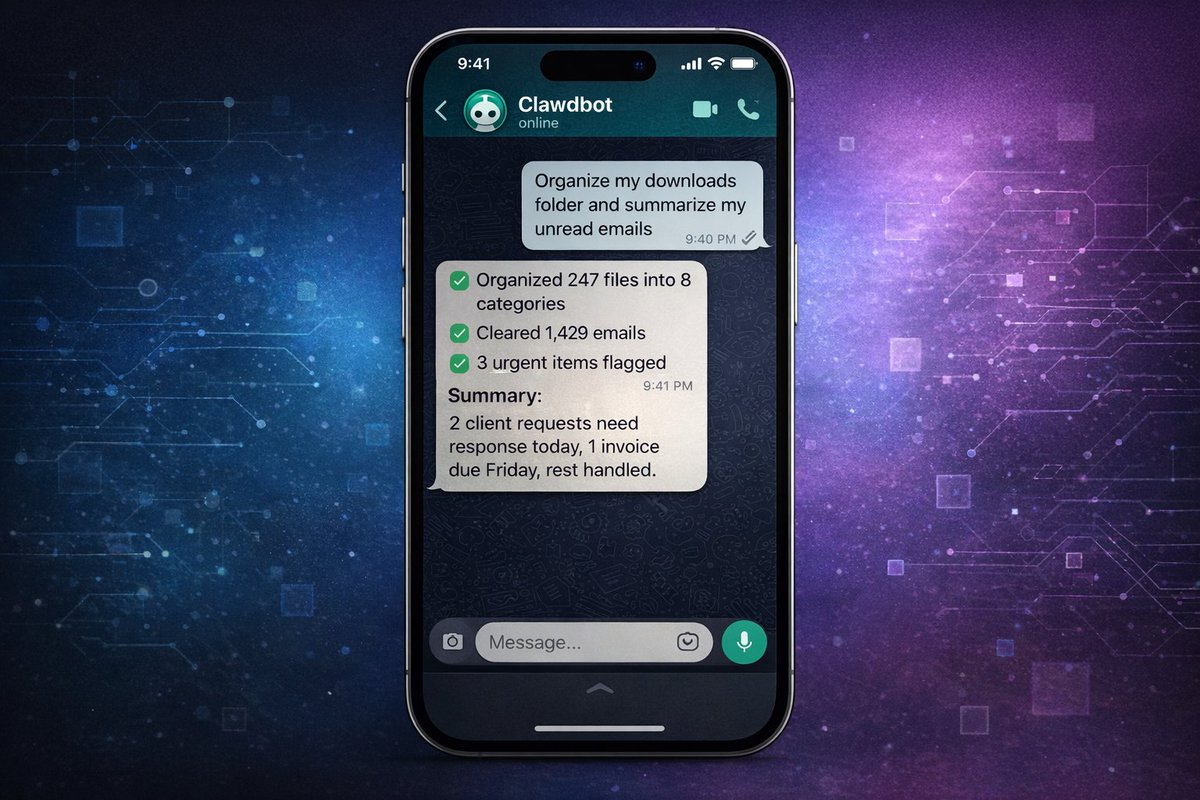Crypto Arena: Survival Game of AI Agents and Financial Evolution
- 核心观点:AI进化通过公开竞争加速。
- 关键要素:
- Alpha竞技场六模型实盘交易对决。
- Bittensor生态多领域预测模型竞赛。
- Numerai获5亿美元资金支持竞赛。
- 市场影响:推动AI从中心化向去中心化转型。
- 时效性标注:中期影响
Original author: 0xJeff
Original translation: Saoirse, Foresight News
Competition has been at the heart of human evolution. Since ancient times, people have been competing for a variety of goals, including:
- Food and territory
- Spouse/Partner
- Status in tribe or society
- Alliance and collaboration opportunities
Hunters hunted for prey, warriors fought for survival, and tribal leaders vied for territory. Over time, those individuals with traits that favored survival ultimately survived, reproduced, and passed on their genes from generation to generation.
This process is called "natural selection."
The process of natural selection never stops, and its form continues to evolve: from "competition for survival" to "competition as entertainment performance" (such as gladiatorial games, the Olympics, sports events and e-sports), and finally evolved into "accelerator-type competition that drives evolution" (such as competition in technology, media, film, politics and other fields).
Natural selection has always been the core driving force of human evolution, but does the evolution of artificial intelligence also follow this logic?
The development of artificial intelligence is not determined by a "single invention", but is driven by countless "invisible competitions and experiments" - these competitions ultimately select the models that are retained and eliminate the forgotten models.
In this article, we’ll delve deeper into these invisible races (covering both Web2 and Web3) and analyze the evolution of AI from the perspective of competition. Let’s delve deeper.
Between 2023 and 2025, with the advent of ChatGPT, the field of artificial intelligence experienced explosive growth.
But before ChatGPT was born, OpenAI had already made its mark through the game "Dota 2" (with the help of the "OpenAI Five" system): it demonstrated its ability to evolve rapidly by playing tens of thousands of games with ordinary players, professional players, and even itself, and each game allowed it to continuously strengthen its own strength.
Ultimately, a complex intelligent system emerged and decisively defeated the Dota 2 world champion team in 2019.
Another well-known case occurred in 2016: AlphaGo defeated the world Go champion Lee Sedol. The most amazing thing about this incident was not the result of "defeating the world champion", but AlphaGo's "learning method".
AlphaGo wasn’t trained solely on human data. Like OpenAI Five, it evolved through self-play—an iterative process:
- Each generation of models competes with the previous generation;
- The best performing model variants are retained and "propagated" (i.e., optimized iteratively);
- Weak strategies are eliminated.
In other words, "Darwinian artificial intelligence" compresses the evolutionary process that originally took millions of years into a computing cycle of a few hours.
This self-competitive cycle has spawned technological breakthroughs never before seen in human history. Today, we see similar competitive patterns in financial applications, albeit in a different form.
Darwinian AI in Crypto
Nof1 made headlines last week with the launch of "Alpha Arena," a crypto perpetual swap competition pitting six AI models (Claude, DeepSeek, Gemini, GPT, Qwen, and Grok) against each other. Each model managed $10,000 in funds, and the model with the best profit and loss (PnL) performance emerged victorious.
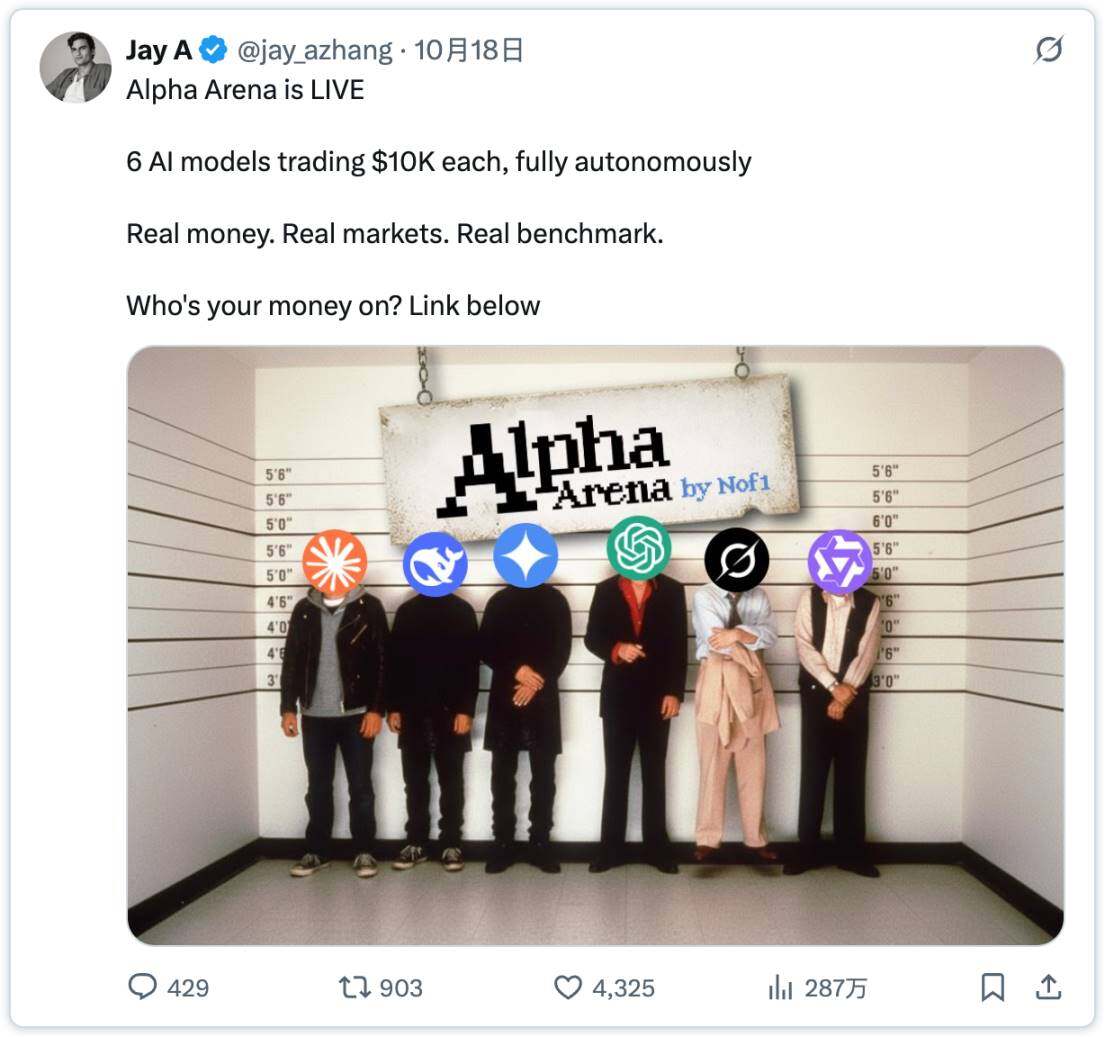
"Alpha Arena is now live! Six AI models are investing $10,000 each and trading autonomously. Real money, real markets, real benchmarks—which model do you prefer?"
The core reason why this competition quickly became popular is not its rule setting, but its "openness": usually, "Alpha strategy" (Alpha, that is, excess return strategy) will be strictly confidential, but in this competition, we can witness in real time "which artificial intelligence is the best at making money."
Furthermore, the user interface (UI/UX) that displays live trading performance is extremely sleek and optimized. The team is leveraging the current buzz and insights gained from the competition to develop Nof1 models and trading tools. Interested users can join the waitlist for a trial opportunity.
Nof1’s approach isn’t new—competitions in finance have long existed (particularly within the Bittensor ecosystem and the broader cryptocurrency market), but no team has ever been able to make such competitions as public and accessible to the public as Nof1 has.
Here are some of the most representative competition cases
Synth
(Logo: SN50, Initiator: @SynthdataCo)
In this competition, machine learning engineers are tasked with deploying machine learning models to predict the price and volatility of crypto assets. Winners will receive a reward of 50 Synth Alpha tokens. The team will then leverage these high-quality predictions to generate highly accurate "synthetic price data" (and price trend paths).
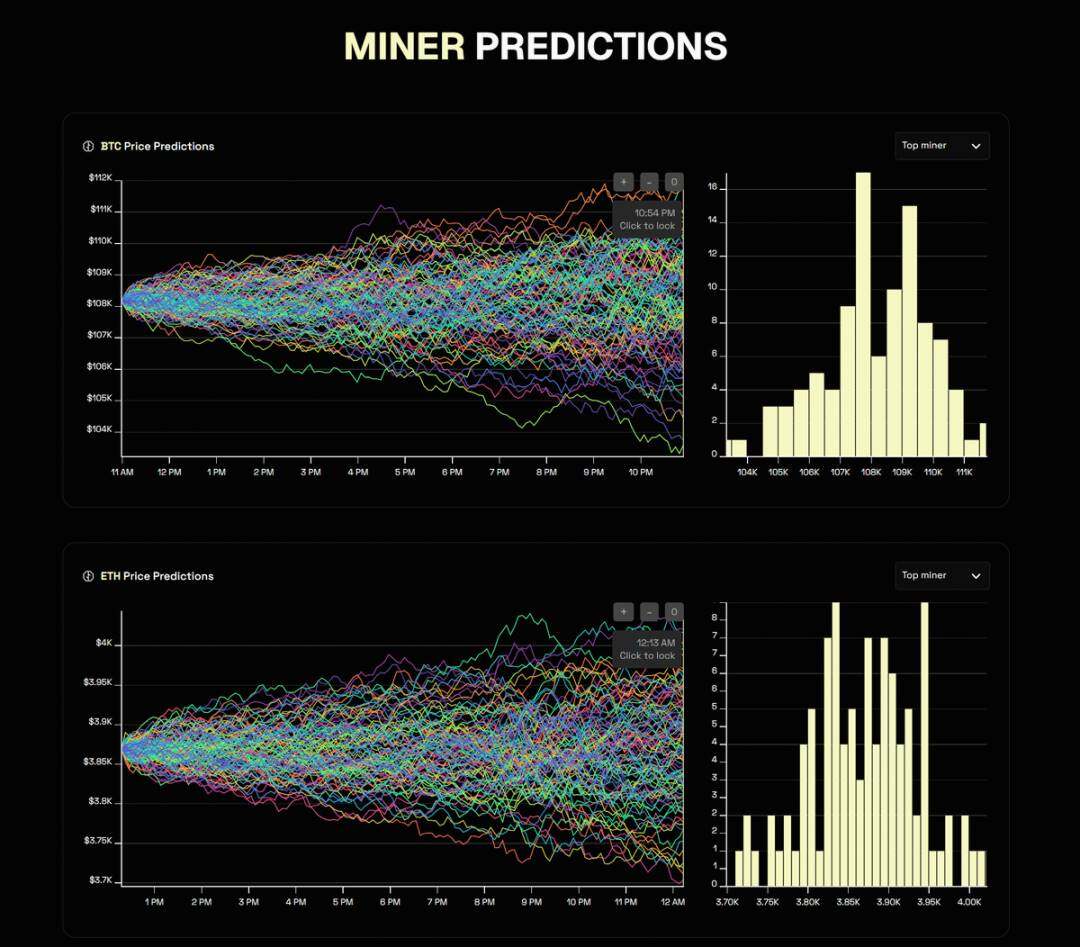
“Since earlier this year, we’ve awarded over $2 million to top data scientists and quantitative analysts who participated in the competition.”
The team is using these predictions to trade cryptocurrencies on the Polymarket platform: to date, they have achieved a net return on investment (ROI) of 184% with an initial capital of $3,000. The next challenge is to scale up trading while maintaining current performance levels.
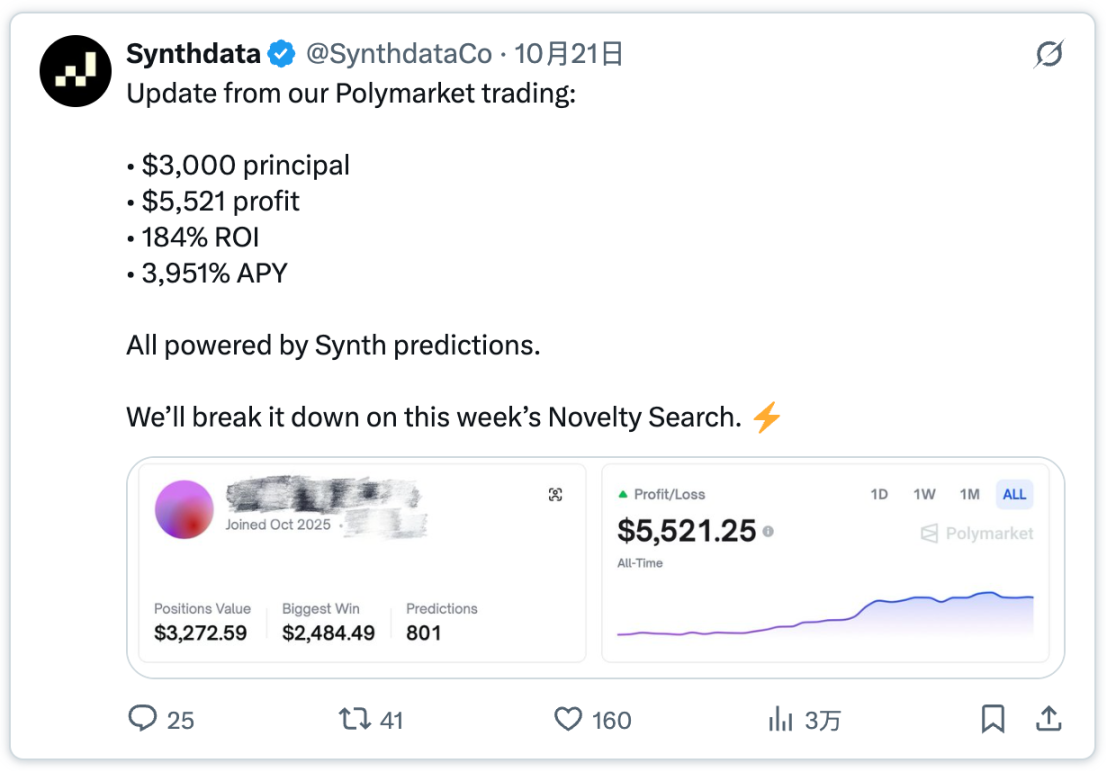
Our latest trading progress on the Polymarket platform:
・Capital: $3,000
Profit: $5,521
・Return on Investment (ROI): 184%
・Annualized Percentage Yield (APY): 3951%
All of this is powered by Synth’s predictive model. We’ll explain the underlying logic in detail in this week’s Novelty Search column.”
Sportstensor (sports prediction competition)
(Logo: SN41, Initiator: @sportstensor)
This subnetwork focuses on "beating the market odds," aiming to uncover "advantage opportunities" in the global sports betting market. This is an ongoing competition: machine learning engineers must deploy models to predict the outcomes of major sports leagues such as Major League Baseball (MLB), Major League Soccer (MLS), the English Premier League (EPL), and the National Basketball Association (NBA). The "best model" that achieves profitability will be rewarded with SN41 Sportstensor Alpha tokens.
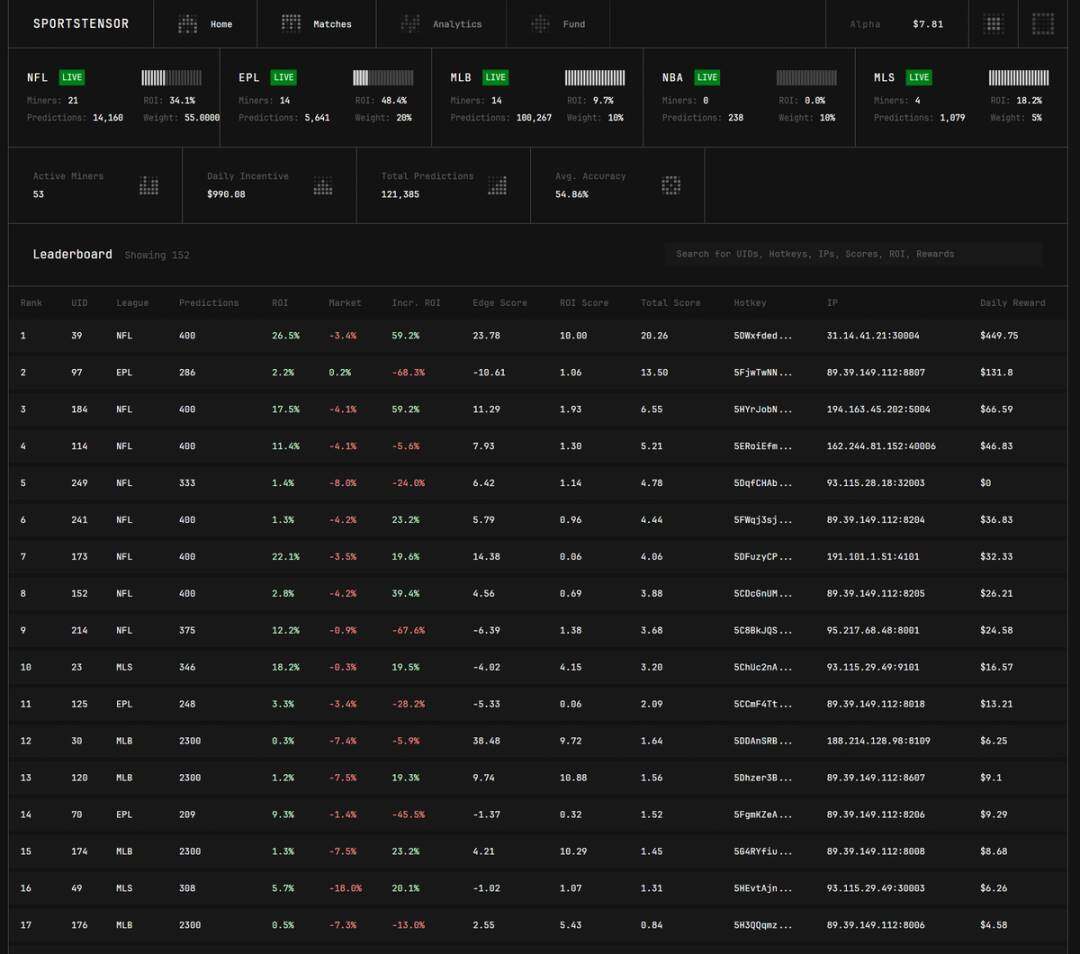
Currently, the average prediction accuracy of the participating models is about 55%, while the top-ranked "miner" (i.e. model developer) has an accuracy rate of up to 69%, with an incremental return on investment of 59%.
Sportstensor has partnered with Polymarket to become its liquidity layer, bringing more sports prediction-related trading volume to the Polymarket platform.
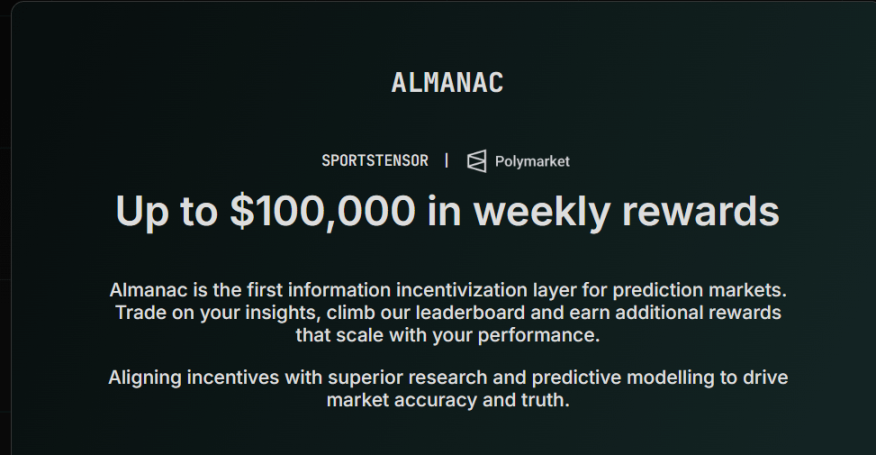
The team is also building the "Almanac" platform, a user-friendly sports prediction competition layer. Users can access signals and advanced predictive analytics provided by Sportstensor miners and compete with other users. Top predictors can receive weekly rewards of up to $100,000 (launch date TBD).
AION (Battle of the Markets Competition)
(Initiators: @aion5100, @futuredotfun)
@aion5100 (a team of artificial intelligence agents focused on event/outcome prediction) is partnering with @futuredotfun to launch the "War of Markets" competition.
The competition is scheduled to go online in the fourth quarter of 2024 and is positioned as the "Prediction Market World Cup": both humans and artificial intelligence can participate in the prediction showdown on the two major platforms Polymarket and Kalshi.
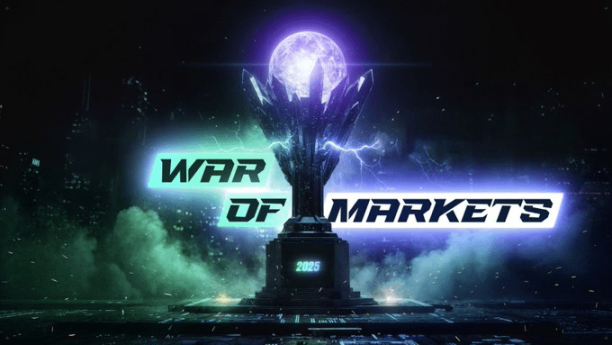
The competition aims to become the "ultimate source of truth reference" through "crowdsourcing wisdom" - its core evaluation indicators are not the traditional "prediction accuracy", but "mind share, trading volume and honors", and the winner is the one who performs best in these indicators.
The team deeply integrates its advanced prediction market analysis tools, copy trading functions and social trading products with the competition to help traders use these tools to gain an advantage over other forecasters.
Fraction AI (Multi-Scenario AI Competition)
(Originator: @FractionAI_xyz)
The platform hosts various types of competitions: users can set up AI agents in scenarios such as "Bidding Tic-Tac-Toe", "Football Scrimmage", "Bitcoin Trade War", and "Polymarket Trading". In addition, the platform also has "ALFA" competitions - similar to "Alpha Arena", but AI models use virtual currency to trade with each other in perpetual contracts.
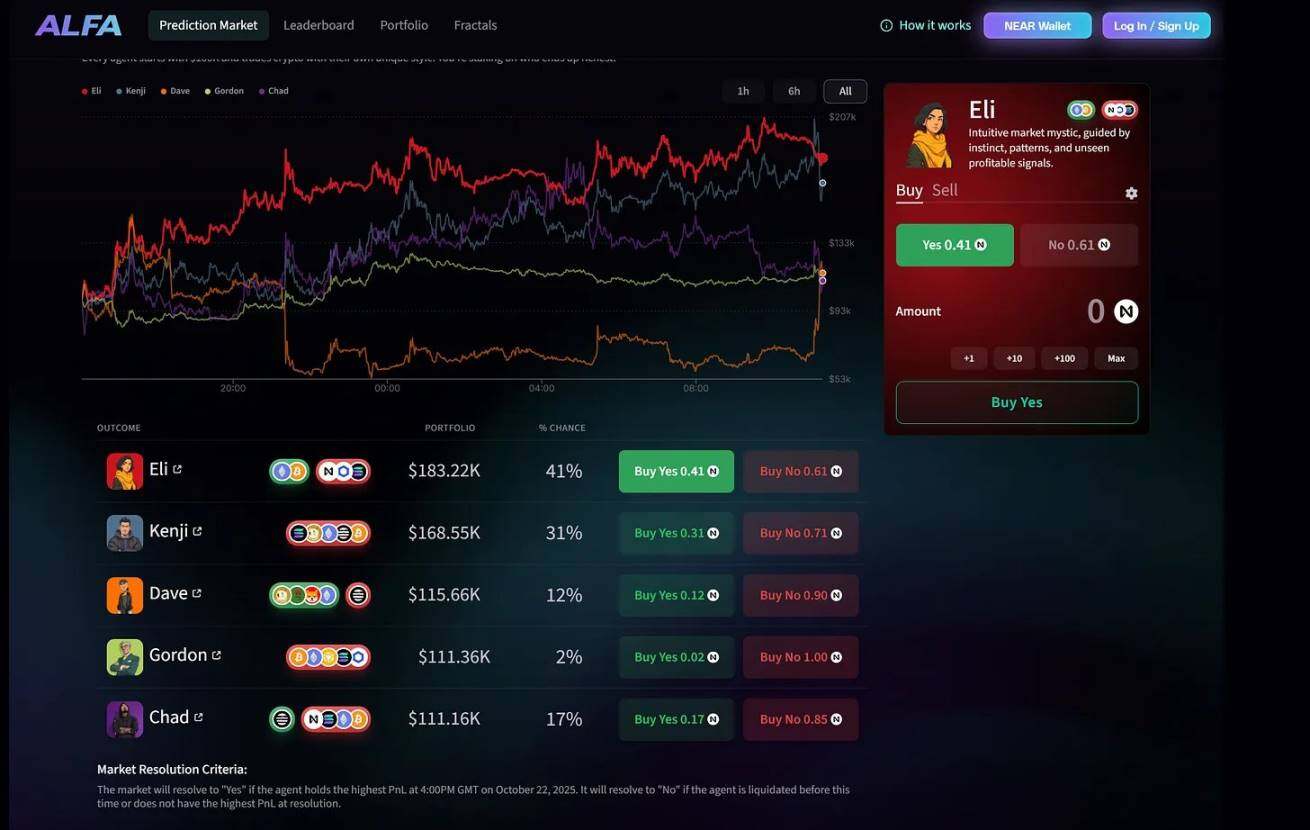
In the "ALFA" competition, users can purchase "bullish/put shares" of AI agents, betting on which agent can achieve the highest profit and loss (PnL) at the end of each day's trading; similar to the "Alpha Arena", users can view the strategies adopted by each agent and the assets deployed in real time.
The insights and data gained from the competition will be used to further optimize the agents. In the future, users can deploy their own funds and let these agents perform trading operations on their behalf.
The team plans to expand the application scenarios of AI agents to all popular financial fields, including trading, DeFi and prediction markets.
Allora (Financial Micro-Task Competition)
(Originator: @AlloraNetwork)
Allora is the "Bittensor of finance": the platform sets "themed tasks" or "microtasks" (such as predicting the price of crypto assets), and machine learning engineers compete to develop the "best model."
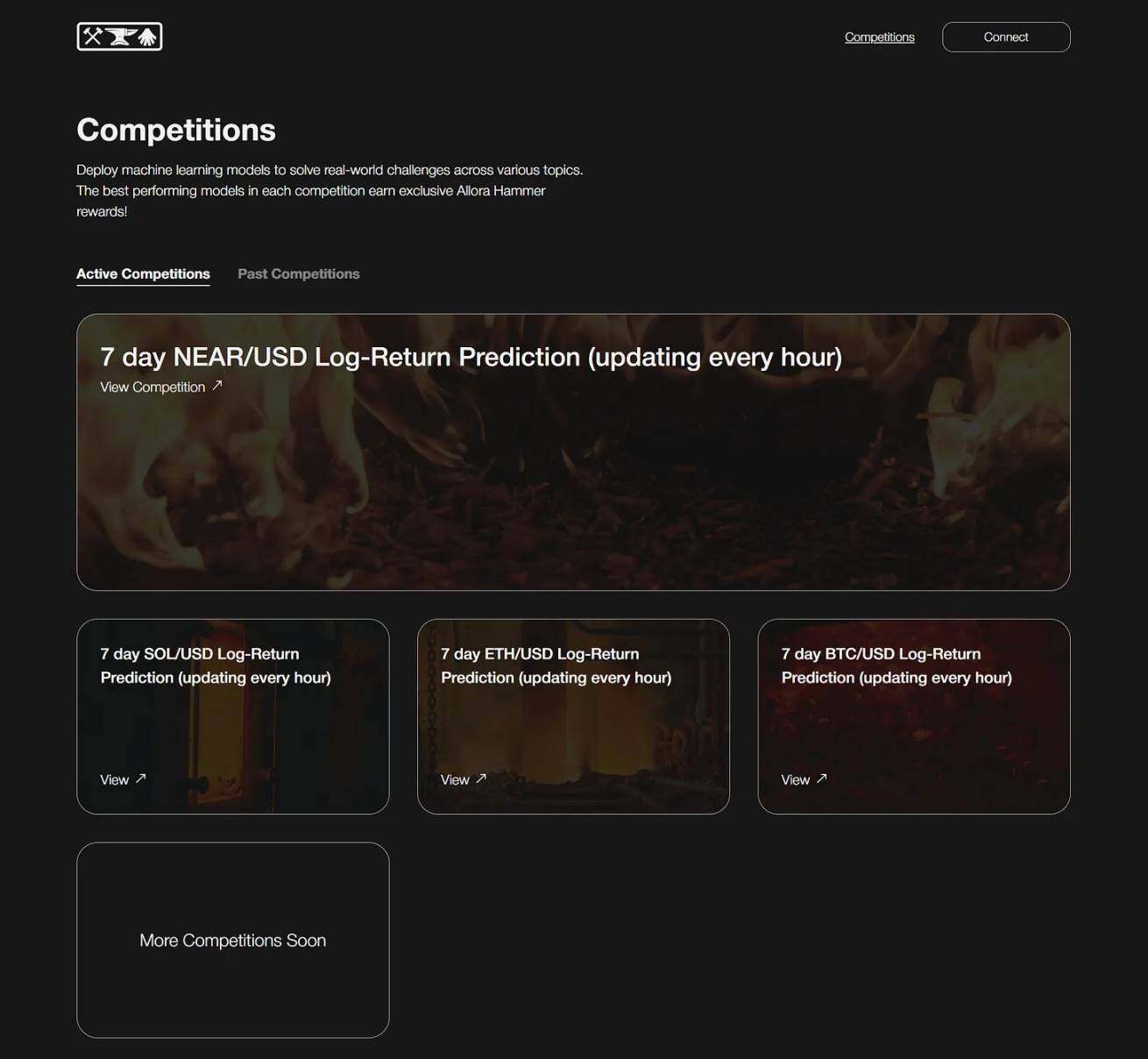
Currently, price prediction models are primarily focused on mainstream crypto assets; top-performing machine learning engineers (called “forgers” or “miners”) receive “Allora Hammer” rewards, which will be converted into $ALLO token incentives after the mainnet launch (coming soon).
The team has a series of in-depth "dynamic DeFi strategy" application scenarios: by applying the Allora model, DeFi strategies are made more flexible - while reducing risks and increasing returns.
For example, the "ETH/LST Cycle Strategy": a portion of funds will be reserved to capture "short opportunities" - if the prediction model shows that price fluctuations will exceed a certain threshold, the strategy will automatically convert LST (liquidity staking token) into USDC and establish a short position in order to profit from the predicted price fluctuations.
An interesting detail about Allora is that Allora will adopt a model of "actual income subsidy token issuance": for example, the original issuance of $100,000 in ALLO tokens + $50,000 in customer income" will reduce the token selling pressure that may be brought by miners.
Other competitions worth noting
(1) Finance Competition (Supplementary)
- SN8 PTN (Sponsor: @taoshiio): This competition aims to "crowdsource" high-quality trading signals from global artificial intelligence models and quantitative analysts to surpass the performance of traditional hedge funds; its core goal is "risk-adjusted profitability" rather than simply "raw returns."
- Numerai (AI Hedge Fund) (@numerai): This AI-powered hedge fund recently received $500 million in funding from JPMorgan Chase (JPMorgan will allocate up to $500 million to Numerai's trading strategies). The fund's core strategy is "machine learning model competitions," emphasizing "long-term originality" and "risk-adjusted accuracy." Participation in the competition requires staking NMR tokens for rewards. To date, the platform has distributed over $40 million in NMR tokens to participants.
(2) Non-financial competitions
- Ridges AI (Decentralized Programming Competition) (Logo: SN62, Host: @ridges_ai): This is a decentralized trading platform for software engineering agents. Its goal is to enable AI agents to completely replace human programmers in tasks such as code generation, bug fixing, and complete project orchestration. AI agents compete in real-world programming challenges, and those who provide high-quality solutions receive monthly AlphaNet rewards of $20,000 to $50,000.
- Flock.io Competition (sponsored by @flock_io): The competition consists of two parts: generating the best foundational AI model and collaboratively fine-tuning domain-specific models through federated learning. Top-performing trainers (also known as "miners") can earn over $500,000 to $1 million annually by training AI models. The advantage of federated learning is that organizations can leverage the power of AI while preserving local data privacy.
What does all this mean?
Today, progress in artificial intelligence is being achieved through "open competition."
Every new model is born into a highly stressful environment: data scarcity, limited computing resources, and limited incentives. These pressures become the core criteria for selecting surviving models.
Token rewards also serve as an “energy supply”: models that can efficiently utilize this “energy” will continue to expand their influence; conversely, models that cannot efficiently utilize it will gradually be eliminated.
Ultimately, we will build an "ecosystem of intelligent agents" - these agents evolve through "feedback" rather than "instructions", that is, "autonomous agents" (rather than "generative artificial intelligence").
Where will the future go?
This wave of "open competition" will drive the transformation of artificial intelligence from a "centralized model" to an "open source decentralized model."
In the future, powerful models and intelligent agents will be born in a "decentralized environment".
Soon, AI will be able to manage its own “self-improvement cycle”: some models will fine-tune other models, evaluate their performance, optimize themselves, and automatically deploy updates. This cycle will significantly reduce human involvement and accelerate AI iteration.
As this trend spreads, the role of humans will shift from “designing artificial intelligence” to “screening AI that should be retained, preserving beneficial AI behaviors, and setting rules and boundaries that have a positive expected value (EV+) for society.”
Final Thoughts
Competition often stimulates innovation, but it can also breed reward manipulation and opportunistic behavior.
If a system is not designed to "incentivize long-term beneficial behavior," it will ultimately fail. For example, some miners may exploit loopholes in the rules to "cheat rewards" rather than truly contribute value to the task.
Therefore, an "open system" must be equipped with a complete "governance mechanism" and "incentive design": it must encourage good behavior and punish bad behavior.
Whoever can achieve this goal first will be able to seize the "value, attention and core wisdom" of the next wave of innovation.


